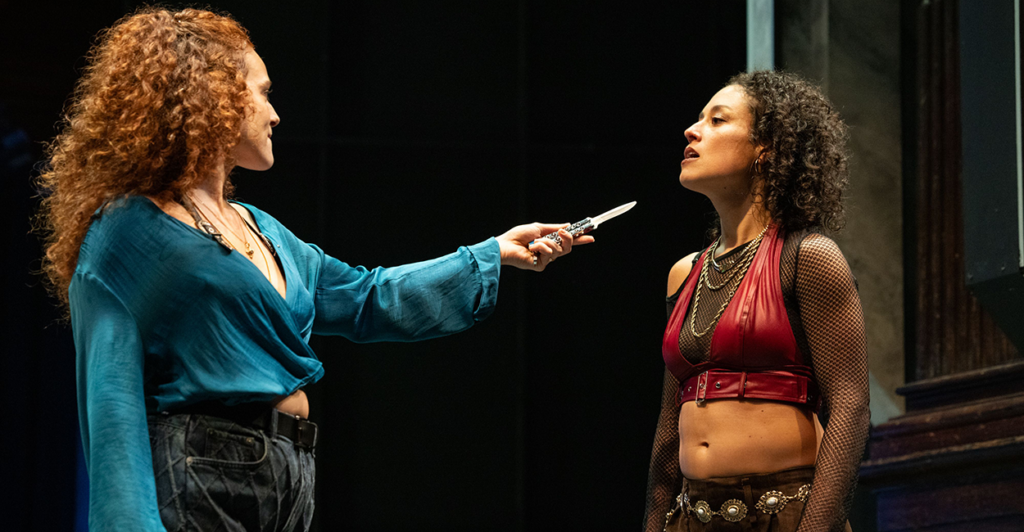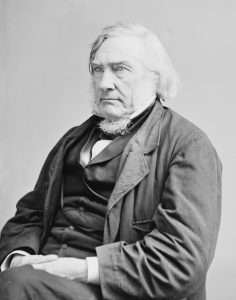“I was at a dinner party recently, and one of the guests exclaimed, ‘I’d rather be single and die alone than marry a Republican!’”
That’s what director Raymond O. Caldwell wrote in the official program for what some reviewers call Folger Shakespeare Library’s “partisan” take on the Bard’s classic tragedy “Romeo and Juliet.”
In Caldwell’s version of the play, as noted in reviews by The Washington Post and MD Theatre Guide, Democrats and Republicans face off in modern-day Washington.
In fact, in this adaptation in the nation’s capital, Juliet’s mother is Hispanic (Puerto Rican) and her father is white; her family wears red-hued costumes (apparently representing the Trumps or Republicans). Romeo and his family are black, for the most part, and they wear shades of blue (apparently representing Kamala Harris or Democrats).
The cast also changes the sexes of some of Shakespeare’s well-known characters in the play, including Mercutio, Romeo’s close friend, and Tybalt, the offspring of Lady Capulet’s brother.

Giovanna Alcântara Drummond as Mercutio, left, gets the better of Alina Collins Maldonado as Tybalt, Lady Capulet’s niece, in “Romeo and Juliet.” (Erika Nizborski/Folger Shakespeare Library)
The director calls the nation’s capital a highly politicized city and the right setting for a variety of reasons.
“I chose Washington, D.C., as a setting because it’s a deeply political city, and sometimes we don’t really think about the way politics play out on the bodies of young people,” Caldwell said in an interview with Folger Shakespeare Library.
Audiences for this “Romeo and Juliet” were confronted throughout with interwoven themes of modern political rivalry. Some were thrilled with this particular modernization of one of Shakespeare’s most enduring plays, but others were discontented with the messaging, judging by interviews conducted by The Daily Signal on several days this month.
“It seemed to me, as a viewer, like their goal might have been to reinforce the stereotypes that we have of Republicans, especially seeing as Juliet’s dad, the way he was portrayed as this abusive, white, heterosexual man,” college student Ashley DeVore told The Daily Signal.
“They were just kind of trying to reinforce all the negative stereotypes that people have of Republicans,” DeVore said. “So, I think that was a kind of a cheap shot at, specifically, men who are conservative.”
Another college student, Larisa Perez, echoing such sentiments, pointed out that the actor playing Juliet’s father used a southern accent. The stagers of the play were trying to paint that character in particular as a racist, she said.
“Of course, he was a white male. Of course, being depicted as like a pseudo-Trump,” Perez told The Daily Signal. “And then, he was portrayed in the play as hitting his wife. Like a wife beater, essentially.”
“So I thought that was, like, a completely unfair and inappropriate categorization of Trump,” she said. “… Now, I’m not sure 100% if that was the case, but this symbol seemed to imply that it was.”
Others disagreed, saying that Caldwell’s production for Folger Shakespeare Library wasn’t biased or divisive.
“I felt like it was very tastefully done and not in a politically divisive way,” one 26-year-old woman, who requested anonymity, told The Daily Signal.
Some members of the audience said the play’s deep themes were difficult to process in this adaptation.
“I thought maybe it was a little heavy-handed … the messaging,” said Margaret, an audience member in her 30s who didn’t want to give her last name and said she had not seen a production of “Romeo and Juliet” before. “It was an interesting theme to pick out for sure.”
A mother of teenagers, who also said she wanted to remain anonymous, said she appreciated that the play involved socio-political issues that confront young people today.
“They completely modernized it, and so you saw that within the play,” she said. “You saw the underlying issues that teens and … young adults have to deal with and struggle with.”
Actors interviewed said their own personal and political beliefs didn’t affect how they portrayed their characters.
“It has nothing to do with what I believe,” Gabriel Alejandro, who played Count Paris, one of Juliet’s suitors, said. “It’s like what my character is, their affiliation, their beliefs—that’s what I’m showing on stage. It doesn’t matter what’s happening outside.”
Luz Nicolas, who played the Nurse, told The Daily Signal that, after the Nov. 5 election, many in the cast and crew were feeling “sensitive.”
“The first show after Election Day was very sensitive, you know, to be on the stage and celebrate life and theater and art,” Nicolas said Nov. 6.
“It was sensitive today,” she added. “I think all the moments at the end of the show—the family’s confrontation after Romeo and Juliet are found dead—it was … a lot to take in.”

Lady Capulet (Fran Tapia) and Lord Capulet (Todd Scofield) react to the death of Tybalt (Alina Collins Maldonado) in “Romeo and Juliet.” (Erika Nizborski/Folger Shakespeare Library)
The play, which opened Oct. 1, ran until Nov. 10.
Caldwell and other members of the production’s creative team didn’t reply to The Daily Signal’s requests for comment by publication time.
A spokesperson for Folger Shakespeare Library, however, replied to a request for comment.
“Shakespeare’s plays are excellent vehicles for understanding and reflecting on the nuances of our lived experiences, and he explored the attachment humans have to tribalism in ‘Romeo and Juliet,’ including the tragic impact on young people and their blossoming love,” the spokesperson said Monday.
“In this production, the characters were not exact representations of real political leaders, but they showed the dire effects that these political divisions, the corresponding violent rhetoric, and isolationism can have on today’s youth.”
Modern adaptations of Shakespeare can work well, Matthew Spalding, dean of Hillsdale College’s Van Andel Graduate School of Government in the nation’s capital, told The Daily Signal in an email.
But, Spalding added, to “make Romeo and Juliet a war between the families of Donald Trump and Kamala Harris was silly.”
The Hillsdale scholar also had an issue with the use of Elvis Presley’s “I Can’t Help Falling in Love.”
“To play an Elvis song at the last scene, at the height of the tragedy, was absurd,” Spalding said. “But the production was true to the original text, and it is simply impossible for any adaptive production to overcome the absolute beauty and emotional power of Shakespeare’s words. That is the lesson here.”
The post Shakespeare’s ‘Romeo and Juliet’ Revamped: A Political Twist Sparks Heated Debate Among Audiences appeared first on The Daily Signal.












 Bengali (Bangladesh) ·
Bengali (Bangladesh) ·  English (United States) ·
English (United States) ·